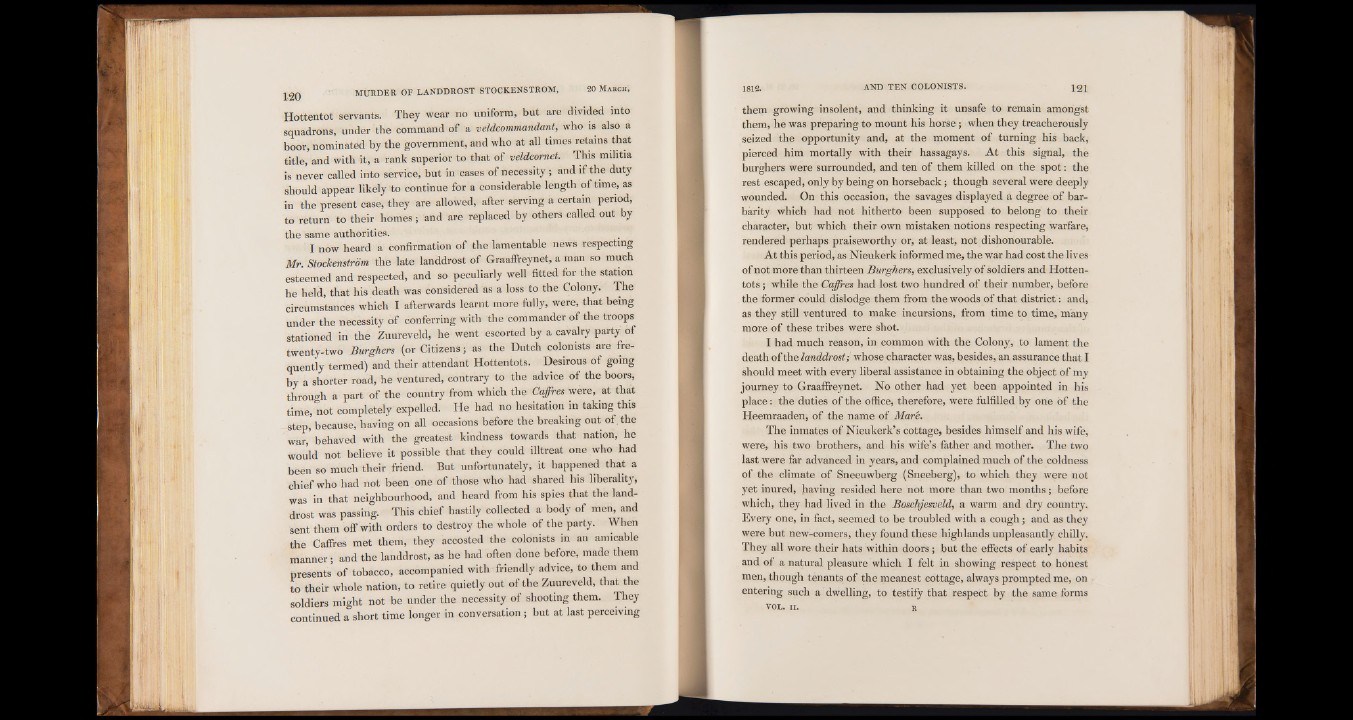
Hottentot servants. They wear no uniform, but are divided into
squadrons, under the command of a veldcommandant, who is also a
boor, nominated by the government, and who at all times retains that
title, and with it, a rank superior to that of veldcomet. This militia
is never called into service, but in cases of necessity ; and if the duty
should appear likely to continue for a considerable length of time, as
in the present case, they are allowed, after serving a certain period,
to return to their homes; and are replaced by others called out by
the saI mneo wa uhtehaorrdit ieas .confirmation of the lamentable news respecting
Mr. Stockenstrom the late landdrost of Graaffreynet, a man so much
esteemed and respected, and so peculiarly well fitted for the station
he held, that his death was considered as a loss to the Colony. The
circumstances which I afterwards learnt more fully, were, that being
under the necessity of conferring with the commander of the troops
stationed in the Zuureveld, he went escorted by a cavalry party of
twenty-two Burghers (or Citizens; as the Dutch colonists are frequently
termed) and their attendant Hottentots. Desirous of going
by a shorter road, he ventured, contrary to the advice of the boors,
through a part of the country from which the Caffres were, at that
time, not completely expelled. He had no hesitation in taking this
step, because, having on all occasions before the breaking out of , the
war, behaved with the greatest kindness towards that nation, he
would not believe it possible that they could illtreat one who had
been so much their friend. But unfortunately, it happened that a
chief who had not been one of those who had shared his liberality,
was in that neighbourhood, and heard from his spies that the landdrost
was passing. This chief hastily collected a body of men, and
sent them off with orders to destroy the whole of the party. When
the Caffres met them, they accosted the colonists in an amicable
manner; and the landdrost, as he had often done before, made them
presents of tobacco, accompanied with friendly advice, to them and
to their whole nation, to retire quietly out of the Zuureveld, that the
soldiers might not be under the necessity of shooting them. They
continued a short time longer in conversation; but at last perceiving
them growing insolent, and thinking it unsafe to remain amongst
them, he was preparing to mount his horse; when they treacherously
seized the opportunity and, at the moment of turning his back,
pierced him mortally with their hassagays. At this signal, the
burghers were surrounded, and ten of them killed on the spot: the
rest escaped, only by being on horseback; though several were deeply
wounded. On this occasion, the savages displayed a degree of barbarity
which had not hitherto been supposed to belong to their
character, but which their own mistaken notions respecting warfare,
rendered perhaps praiseworthy or, at least, not dishonourable.
At this period, as Nieukerk informed me, the war had cost the lives
of not more than thirteen Burghers, exclusively of soldiers and Hottentots
; while the Caffres had lost two hundred of their number, before
the former could dislodge them from the woods of that district: and,
as they still ventured to make incursions, from time to time, many
more of these tribes were shot.
I had much reason, in common with the Colony, to lament the
death of the landdrost; whose character was, besides, an assurance that I
should meet with every liberal assistance in obtaining the object of my
journey to Graaffreynet. No other had yet been appointed in his
place: the duties of the office, therefore, were fulfilled by one of the
Heemraaden, of the name of Mare.
The inmates of Nieukerk’s cottage, besides himself and his wife,
were, his two brothers, and his wife’s father and mother. The two
last were far advanced in years, and complained much of the coldness
of the climate of Sneeuwberg (Sneeberg), to which they were not
yet inured, having resided here not more than two months; before
which, they had lived in the Boschjesveld, a warm and dry country.
Every one, in fact, seemed to be troubled with a cough; and as they
were but new-comers, they found these highlands unpleasantly chilly.
They all wore their hats within doors; but the effects of early habits
and of a natural pleasure which I felt in showing respect to honest
men, though tenants of the meanest cottage, always prompted me, on
entering such a dwelling, to testify that respect by the same forms
vol. u . B